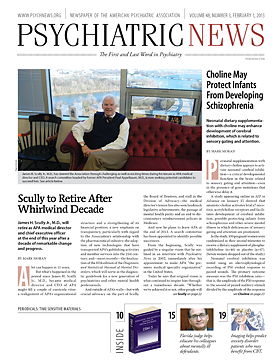The tragic deaths of 20 children in Newtown, Conn., in December brought to the forefront recent research on the health outcomes of bereavement by parents who have lost their children.
Parents in Newtown will be at risk for at least several years and should be followed to see that they have access to care, said James Bolton, M.D., an assistant professor of psychiatry at the University of Manitoba, in an interview with Psychiatric News.
“We have to recognize that they are vulnerable and that treatment needs to be readily available.”
Bereavement responses vary widely, of course. Some people are more resilient than others. However, the death of a child—regardless of age—can have harmful physical effects on surviving parents, wrote Mikael Rostila, Ph.D., and colleagues in the October 2012 Journal of Epidemiology and Community Health. Rostila is an associate professor of sociology at the Centre for Health Equity Studies (CHESS) at Sweden’s Stockholm University and the Karolinska Institute.
The researchers distinguished between death by “natural” causes, such as disease, and “unnatural” ones, such as by suicide, homicide, or accident.
“Our data . . . indicate that unnatural causes of child death have a stronger impact than natural deaths on parental mortality, but mainly among mothers who lost young children (aged 10-17 years),” said the researchers. The mortality effect on fathers in the Swedish study was not significant.
“In other age groups we found no difference in the effect of natural versus unnatural child deaths on the mortality of parents,” said Rostila in an interview. “In other words, unnatural child deaths are particularly detrimental for mothers when the child is young at the time of death.”
Mothers of children aged 10-17, the youngest age group in this study, faced an increased risk of 31 percent in all-cause mortality, but that increase was driven largely by an increased risk of 48 percent among mothers whose children died unnatural deaths.
Although his study did not cover younger children, Rostila speculated that the death of a child under age 10 might be at least as detrimental given the strong emotional bond and attachment between the child and the parent.
“The death of a young child is also extremely unexpected, which could lead to strong feelings of grief and difficulty in coping with the death,” he said.
Rostila and colleagues also found a 26 percent to 33 percent increased association with mortality among the siblings of the deceased child. But so little research has been done on this group that Rostila called them “the forgotten griever[s].”
The psychological effects on parents can crop up in a relatively short time, Bolton pointed out.
In a study published online December 10, 2012, in Archives of General Psychiatry, Bolton and colleagues compared parents bereaved by the death of their children by either suicide or motor-vehicle crash.
He and his colleagues found associations in both groups with increased rates of depression, anxiety, and marital breakup, although not with drug or alcohol use disorders.
“There was quite a dramatic effect on parents, but there wasn’t much of a difference in outcomes relating to the specific cause of the child’s death,” said Bolton. “So the parents of children killed in a mass shooting will be a very vulnerable group, and the increased risk will be visible soon, even with the first two years.”
Bolton’s two-year study was too short to observe physical effects on bereaved parents of a child’s death, but the short-term mental health effects are likely to translate into physical effects eventually, he said.
In one respect, the aftermath was different for parents following a suicide. The stigma faced by the parents of children who died by suicide was often manifested by the surrounding community, which shunned them or at least felt awkward in approaching the family, said Bolton. That should not be the case in Newtown, however, where the community has rallied around the parents of the children who were shooting victims at the elementary school, he said. ■
